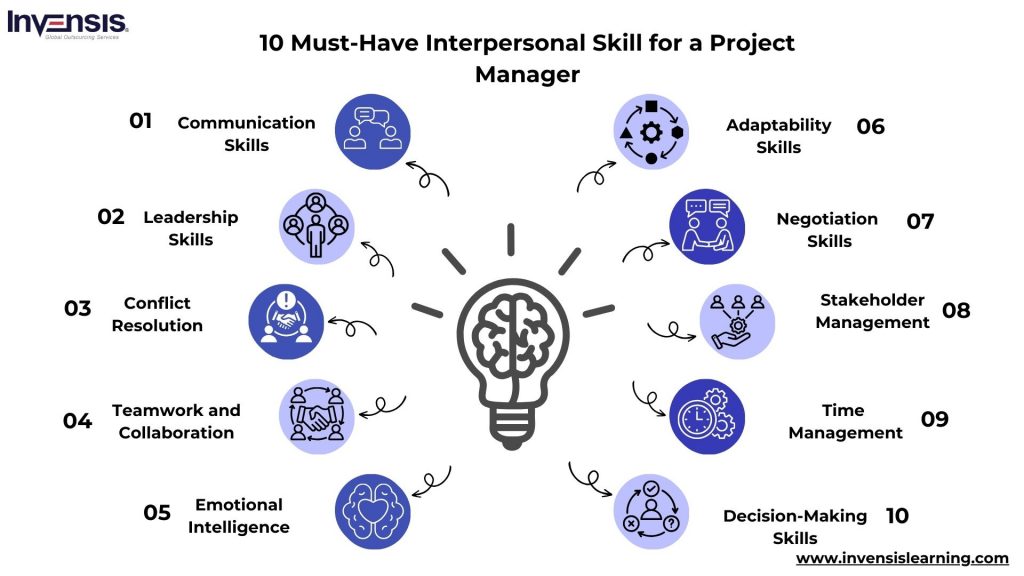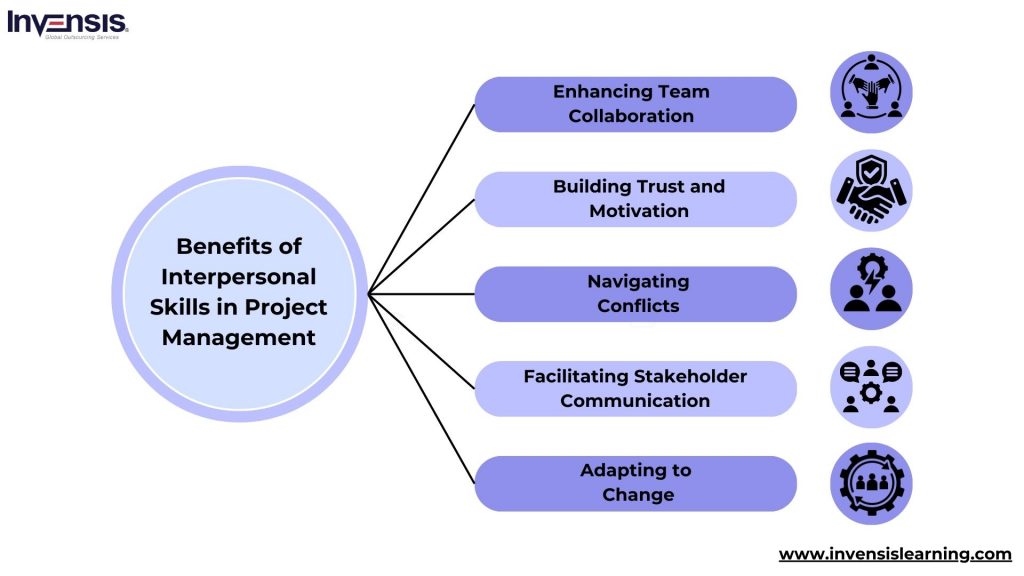
Managing projects requires more than taking care of schedules and budgets; it’s about people. Imagine a world where collaboration isn’t just a buzzword but the reason for success, where communication isn’t just about words but about building bridges between diverse teams.
So, what are these?
These are interpersonal skills.
Is this all?
No, it isn’t
In this blog, we will explore the significance of interpersonal skills in project management, where the ability to lead, inspire, and connect isn’t just an advantage—it’s the difference between a good project manager and a great one.
Table of Content:
- What are Interpersonal Skill?
- Key Interpersonal Skills Required in Project Management
- Why Interpersonal Skills are Important in Project Management?
- Conclusion
What are Interpersonal Skills?
Interpersonal skills, also known as “people skills,” encompass the qualities and abilities that enable effective communication and relationship-building with others. These skills are demonstrated through both verbal and nonverbal interactions.
Strong interpersonal skills are pillars of excellence in project management. They are desirable and essential for effective collaboration, adept navigation of complexities, and graceful adaptation.
Picture a project manager who excels in technical prowess, fosters open communication, builds cohesive teams, and navigates conflicts with finesse. In project management, these interpersonal skills aren’t just valued but indispensable.
Key Interpersonal Skills Required in Project Management
In project management, technical skills, and conceptual insight are foundational for crafting plans for project development. However, true project success depends on integrating these skills with diverse interpersonal skills.
These skills are important, ensuring effective collaboration, communication, and conflict resolution throughout the project lifecycle. Let’s explore the essential interpersonal skills of project management, understanding how their mastery elevates project outcomes and helps build a systematic, high-performing project environment.
1. Communication
Effective communication in project management involves conveying project goals, updates, and expectations clearly to team members, stakeholders, and clients. It ensures everyone understands their roles and responsibilities, minimizes misunderstandings, and fosters collaboration throughout the project lifecycle.
Project managers need to establish transparent communication channels, facilitate discussions, and actively listen to ensure that information flows smoothly and everyone remains aligned with project objectives.
2. Leadership
Project managers play a key role in providing direction, motivating team members, and driving the project towards successful completion. Strong leadership skills are essential for inspiring confidence, delegating tasks effectively, and promoting teamwork.
Project managers must lead by example, communicate a clear vision, and empower team members to take ownership of their roles, bringing a positive work environment that is facilitative to achieving project goals.
3. Conflict Resolution
Conflicts are unavoidable in project management, but how they are managed can significantly impact project outcomes. Project managers need strong conflict resolution skills to address disagreements promptly and constructively.
By resolving conflicts effectively, project managers can prevent disruptions, maintain high team morale, and ensure that project progress remains uncontrolled, ultimately contributing to project success.
4. Teamwork and Collaboration
Project management is collaborative, requiring effective teamwork among diverse team members to achieve project objectives. Project managers must cultivate a collaborative environment where team members feel valued and empowered to contribute their skills and expertise.
Encouraging open communication, promoting trust and respect, and leveraging each team member’s strengths are essential for fostering teamwork and maximizing project outcomes.
5. Emotional Intelligence
Emotional intelligence is crucial for project managers to understand and manage their own emotions and those of others. By demonstrating empathy, building connections, and fostering a supportive work environment, project managers can enhance team unity and mitigate conflicts that may arise during the project lifecycle.
Emotional intelligence enables project managers to navigate interpersonal dynamics effectively, fostering positive relationships and contributing to project success.
6. Adaptability
Projects often encounter unexpected challenges or changes, requiring project managers to be adaptable and flexible. Being able to adjust plans and strategies while remaining focused on project objectives helps project managers effectively navigate uncertainties and keep the project on course towards successful completion.
Adaptability enables project managers to respond proactively to changing circumstances, ensuring project success despite unexpected obstacles.
7. Negotiation Skills
Negotiation skills are essential for project managers to navigate the complex dynamics of stakeholder interests, resource limitations, and project needs. By finding common ground, balancing competing interests, and securing essential resources, project managers can overcome challenges and drive the project toward successful completion.
Effective negotiation enables project managers to reach agreements that benefit all involved parties, ultimately contributing to project success.
8. Stakeholder Management
Effective stakeholder management involves identifying, engaging, and managing the expectations of all parties involved in the project, including clients, sponsors, end-users, and other stakeholders.
Project managers need to establish clear lines of communication, build relationships, and ensure stakeholders are informed and involved throughout the project lifecycle.
By understanding stakeholders’ needs and priorities, project managers can align project objectives with stakeholder expectations, mitigate risks, and secure support for project initiatives.
9. Time Management
Time management is critical for project managers to ensure tasks are completed efficiently, and deadlines are met. Project managers must prioritize activities, allocate resources effectively, and develop realistic project schedules.
By managing time effectively, project managers can minimize delays, avoid uncertainties, and maintain momentum to keep the project on track towards successful completion.
10. Decision-Making
Project managers are often faced with making important decisions that impact project outcomes, resources, and stakeholders. Effective decision-making involves gathering relevant information, analyzing risks and alternatives, and considering the potential impact on the project’s objectives.
Project managers must make timely and well-informed decisions while balancing competing priorities and stakeholders’ interests. By making sound decisions, project managers can navigate uncertainties, resolve issues, and guide the project towards success.
Why Interpersonal Skills are Important in Project Management?
Interpersonal skills play a key role in project management, primarily because managing projects is as much about effectively leading and coordinating with people as it is about handling tasks and deadlines.
Projects often bring together a diverse group of individuals with unique expertise, perspectives, and expectations. The success of a project depends significantly on the project manager’s ability to bring collaboration, motivate team members, and maintain a productive work environment.
Here are some reasons why interpersonal skills are critical in project management:
-
Enhancing Team Collaboration
Interpersonal skills such as communication, active listening, and empathy are important for enhancing team collaboration. They allow project managers to convey project goals and expectations clearly, understand the concerns and suggestions of team members, and address conflicts. This leads to a more cohesive team that can work efficiently towards common objectives.
-
Building Trust and Motivation
Trust is foundational in any team, and a project manager with strong interpersonal skills can build trust by being transparent, consistent, and respectful. These skills also help in recognizing the contributions of team members, providing constructive feedback, and motivating the team. A motivated team is more likely to be engaged and committed to the project’s success.
-
Navigating Conflicts
Conflict is inevitable in project management due to differing opinions and interests. Interpersonal skills are essential for identifying, addressing, and resolving conflicts in a manner that is constructive rather than detrimental to the project. Effective conflict resolution ensures the project progresses smoothly and team dynamics remain positive.
-
Facilitating Stakeholder Communication
Projects often involve various stakeholders, including clients, sponsors, and end-users, each with their own set of expectations. Interpersonal skills enable project managers to communicate effectively with these stakeholders, manage their expectations, and ensure their needs are considered in the project planning and execution. This is crucial for the project’s acceptance and success.
-
Adapting to Change
Project changes can occur due to various factors. Interpersonal skills such as flexibility, adaptability, and problem-solving are crucial for navigating these changes. They allow project managers to lead by example, encouraging their teams to embrace change and find innovative solutions to new challenges.
Conclusion
Interpersonal skills like communication, teamwork, leadership, and the skills mentioned above are crucial in project management. They help get everyone on the same page, solve problems, and work well with others.
By improving these skills, project managers can handle challenges, build strong relationships, and make projects successful.
If you’re eager to boost your project management abilities, check out our Invensis Learning Project Management certification courses. We offer tailored training to help you become a skilled project manager.
















